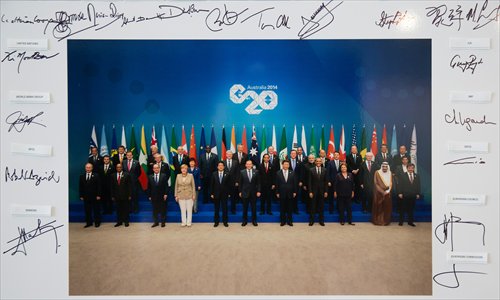Xi vows key support for G20
China to drive progress toward 2 percent growth target

A handout picture released by the organizer of the G20 summit on Sunday shows the official G20 summit "family photo" taken on Saturday and signed by G20 leaders on Sunday. Photo: AFP
China is expected to play a "prominent" role in achieving the growth targets set up by Group of 20 (G20) leaders during a two-day summit over the weekend, including lifting the 20 countries' GDP and setting up a global infrastructure hub.
This role prevails despite China's current economic slowdown. China will still inject vigor into global economic growth because of driving factors such as its large domestic consumption, Xu Hongcai, director of the Department of Information under the China Center for International Economic Exchanges, a Beijing-based think tank, told the Global Times.
China will contribute 27.8 percent to total world GDP growth this year, according to an IMF report. China also contributed 15 percent of the almost 1,000 initiatives proposed by G20 members to help achieve a 2 percent growth target for G20 economies, said Zhu Guangyao, Chinese vice minister of finance, in a G20 finance minister meeting in October.
The growth target was included in a communiqué wrapping up the G20 summit in Brisbane, in which the leaders endorsed an ambitious goal set earlier this year to lift the G20's GDP by at least an additional 2 percent by 2018. The group's commitments, if fully implemented, will deliver 2.1 percent as indicated by IMF-OECD analysis, and add more than $2 trillion to the global economy and create millions of jobs.
Zhang Jianping, a research fellow with the Academy of Macroeconomic Research under the National Development and Reform Commission, told the Global Times on Sunday that, "It is the first time for the G20 leaders to set up an exact GDP target during the summit." And China will play a prominent role in fulfilling the growth target in view of its growth potential.
Chinese President Xi Jinping said at the G20 summit that China will maintain its economic momentum and make greater contributions to the global economy.
Noting that the world economy has gradually climbed out of its recent doldrums but that recovery remains lackluster overall, Xi said the top priority for G20 members now is to coordinate macroeconomic policy, mitigate economic risks, create more jobs and improve people's livelihood.
In addition to the ambitious economic growth target, the leaders of the world's largest developed countries and emerging economies also endorsed a Global Infrastructure Initiative, a multi-year plan to spur quality public and private infrastructure investment.
To support the initiative, G20 leaders pledged to establish a Global Infrastructure Hub with a four-year mandate, contributing to developing a knowledge sharing platform and network between governments, development banks and other international organizations.
Xu noted that the G20 summit achieved progress in reinforcing infrastructure construction by offering innovative financial services.
"An interconnectivity of infrastructure globally will be helpful to stimulate the world economic growth," Zhang said.
Xi pledged to make contributions to global infrastructure investment via such initiatives as the Silk Road Economic Belt, the 21st Century Maritime Silk Road, the Asian Infrastructure Investment Bank and the Silk Road Fund.
After successfully hosting the Asia-Pacific Economic Cooperation meetings this year, China will play host to the G20 summit in 2016.
President Xi said China is confident it will succeed in its role as the chair of the 2016 G20 summit and a member of the three-member management group in 2015 and 2017. The group's role is to ensure continuity in the G20's work and management across host years.
Zhang said the G20 summit is a "fairer platform" compared with other financial organizations such as the IMF and World Bank, which are dominated by developed counties and regions, who are not familiar with conditions of developing countries.
Unlike some other international organizations, the G20 has no permanent staff of its own. The G20 chair rotates among members, and is selected from a different regional grouping each year.
Agencies contributed to this story